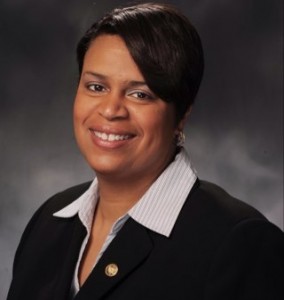JEFFERSON CITY, Mo. — When a stripped-down version of an education reform bill, Senate Bill 125, passed through both chambers of the General Assembly near the end of the 2013 legislative session, everybody knew what part of the state would be most impacted.
The bill — which deals primarily with removing a two-year waiting period required of the Department of Elementary and Secondary Education (DESE) before intervening in an unaccredited school district — passed with the city of Kansas City, and its unaccredited public schools, in mind.

“Let’s not kid ourselves,” said Mike Wood, associate executive director of governmental relations for the Missouri State Teachers Association. “The bill technically applies to any district in the state, but it was done with Kansas City in mind.”
The bill will allow DESE to intervene as early as this year in Kansas City, where scores for the standardized testing conducted in May will be available in about 30 days. The scores could determine whether DESE and the State Board of Education choose to take control of the district by appointing a special administrative board to replace or supplement the current district board of education.
Rep. Gail McCann Beatty, D-Kansas City, said Kansas City public schools already have begun to make some changes that could impact the scores in a positive way, and that, coupled with enough improvement, could make intervention unnecessary.
“They’ve tried some new things there,” McCann Beatty, who is also the assistant minority floor leader, told The Missouri Times. “Those of us representing Kansas City have been told by the superintendent and the school board that they will make great strides in this year and that we’ll see improvement, and I hope that’s true.”

McCann Beatty voted for both the final version of SB 125 as well as the earlier, more controversial one. An earlier version of the legislation featured evaluations for schools principles and administrators that would determine employment. An even earlier version of the bill, House Bill 631, contained similar evaluations for teachers.
House Speaker Tim Jones, R-Eureka threw tremendous support behind both SB 125 and HB 631. However, Jones faced significant opposition from public teacher organizations across the state, and struggled to bring his own members in on the reforms, losing the vote on each bill.
Without significant reforms, both sides continue to debate what evaluations should look like and, in some cases, whether they are even necessary at all.
“Are there bad teachers out there? Probably. I don’t know,” McCann Beatty said. “But I can tell you there does need to be a system in place to remove those teachers and prevent them from harming a quality education environment.”
Wood said there already were new evaluation models, one of which is in a pilot program through DESE, in place to effectively evaluate teachers. In fact, the MSTA, the National Education Association and the American Federation of Teachers’ respective Missouri chapters took part in drafting the model DESE is testing and ultimately looking to adopt.
Wood said no other models were needed from the legislature.
“We’ve already got evaluation programs,” Wood said. “One of the reasons we didn’t offer language this year, legislatively, to deal with teacher evaluations is because we were already working with DESE to make the change departmentally.”
Evaluations may not come from the legislature though, if some education reform groups are successful.
Katie Casas, state director of the Children’s Education Council of Missouri, said there is wide support among activists and voters for a ballot initiative to deal with teacher evaluations.

“We’re very supportive of an effort to accomplish this on the ballot,” Casas told The Missouri Times. “I just think real education reform might not happen fast enough in the Capital and we have the support of the voters, even if the legislators are not responding.”
Casas said she was very pleased with the new DESE evaluation pilot, but believes the program needed to be codified statewide.
The ballot measure she supports —which several current and former teachers filed suit to challenge after the Secretary of State’s Office approved the ballot title and the fiscal impact — would allow local districts to develop their own evaluations but would require them to be approved by DESE at the state level, among other provisions.
The measure also preserves the rights of teachers to collectively bargain, limits teacher contracts to three years and eliminates seniority-based layoffs in public schools, sometimes referred to as “First in, Last out.”
With rural Republicans resisting measures they see as limiting local school district control, and urban Democrats sometimes unwilling to challenge powerful local teachers unions, a ballot measure may be the only way to enact reforms dealing with teacher evaluations and contracts.
Whether or not Missouri voters are prepared to take such a vote remains to be seen.
[divider style=”tiny”][/divider]
This is The Missouri Times’ first installment of this education series. Stay tuned as we feature other issues related to state education during the coming weeks.
Collin Reischman was the Managing Editor for The Missouri Times, and a graduate of Webster University with a Bachelor of Arts in Journalism.



